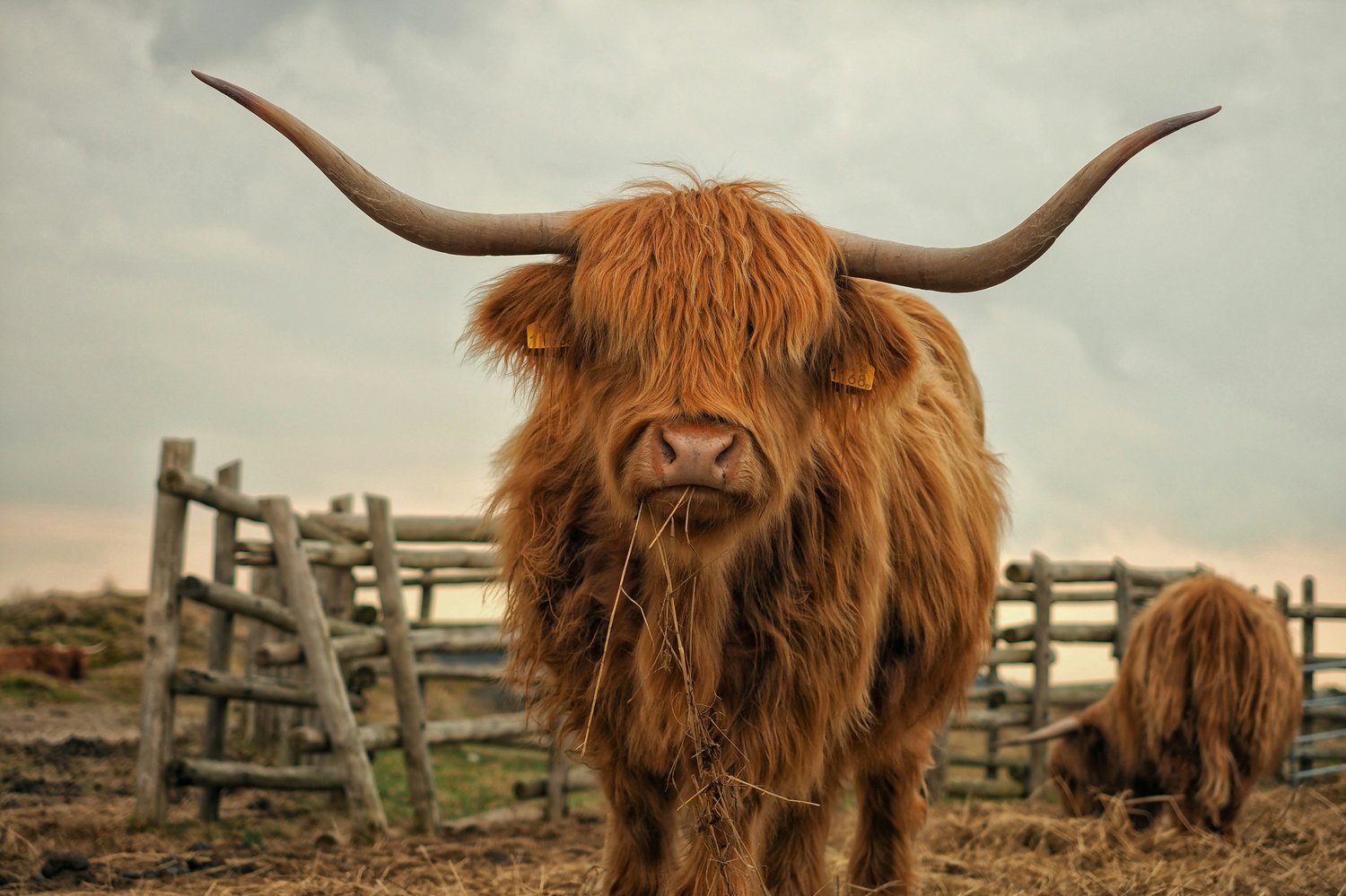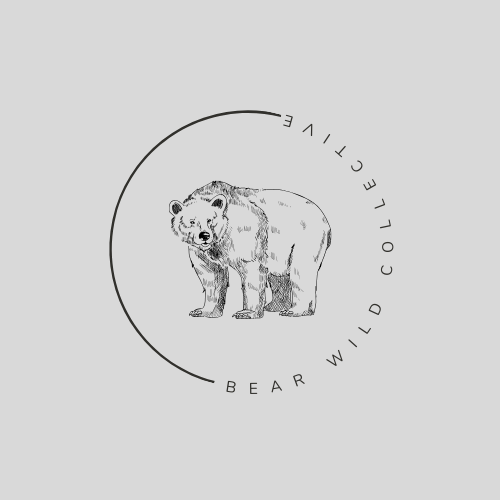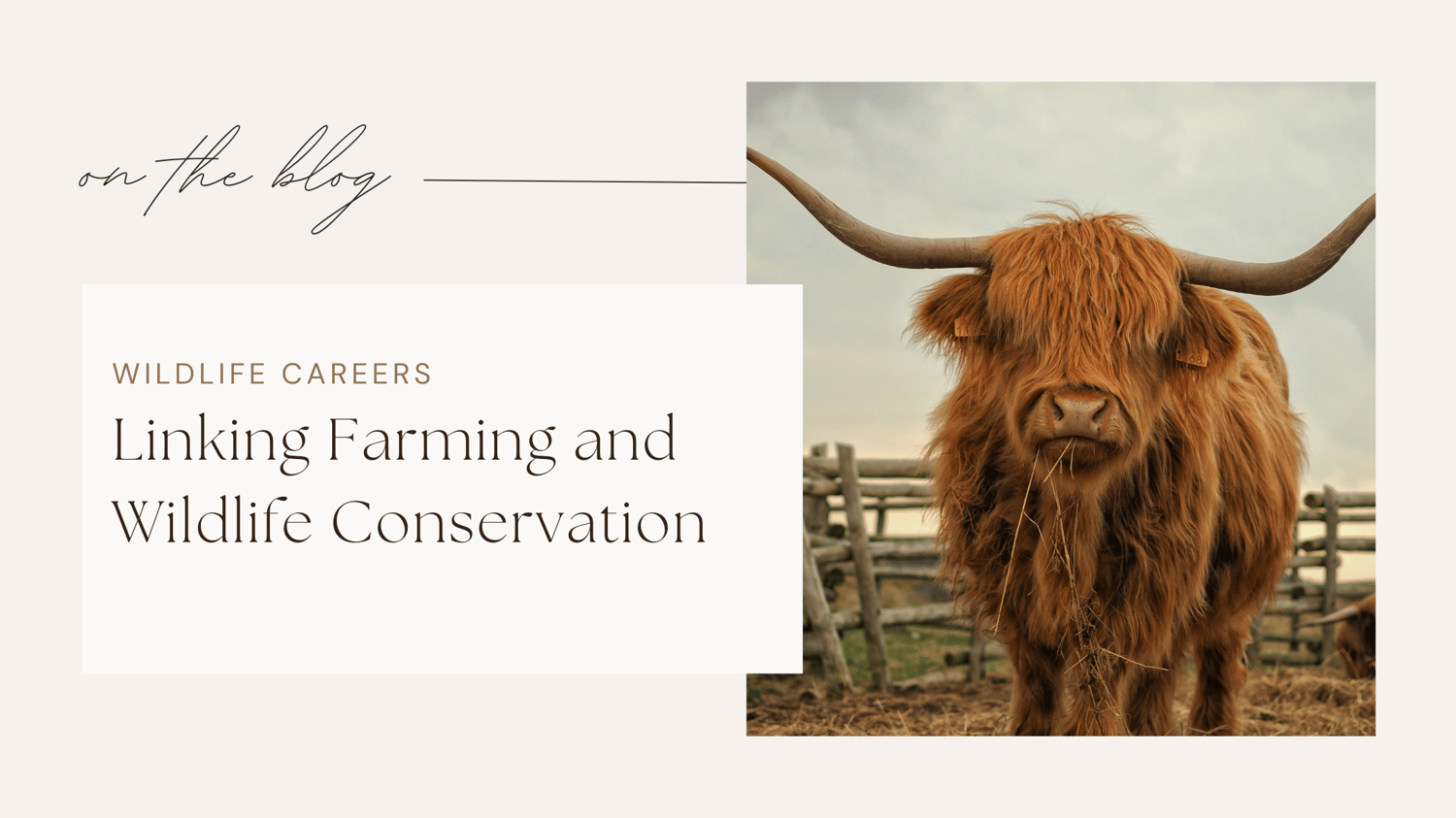Jobs in the wildlife sector may seem distinct from other animal based sectors like agriculture, but they’re more interconnected than you might think. In our Wildlife Career Accelerator and Wildlife Work Directory guides we touch on these links - such as how farming animals for agriculture causes deforestation (we’ve all seen the images of orangutans on scorched forest land cleared for soy production), how predators like lions and wolves have conflict with farmed animals in rural areas, and how wildlife such as insects, reptiles, and fish are increasingly farmed as alternative proteins. These links mean that wildlife expertise is often needed in many farmed animal advocacy organisations.

[Credit Pascal van de Vendel]
Impact of Animal Agriculture on Wildlife and Ecosystems
Animal agriculture is a leading driver of deforestation, habitat loss, pollution, and climate change, all of which have detrimental effects on wildlife. The expansion of agricultural land to raise livestock is a significant cause of deforestation, particularly in biodiversity hotspots like the Amazon rainforest. The forest land cleared for cattle ranching is often home to many endangered species, such as jaguars, tapirs, and macaws.
The intensive farming methods used to raise animals often involve monocropping of feed crops, which reduces biodiversity and degrades the quality of natural habitats. The overuse of water and pesticides in these farming practices can further harm surrounding ecosystems and wildlife. Animal agriculture also contributes to greenhouse gas emissions, making it a key player in the global climate crisis, which is one of the most pressing threats to biodiversity. The greenhouse gases produced by livestock—such as methane—contribute to global warming, which can alter habitats and drive species extinction.
How Animal Agriculture Organisations Contribute to Wildlife Conservation
Several organizations working on animal agriculture are directly or indirectly contributing to wildlife conservation through a variety of strategies. These organisations focus on reducing the environmental footprint of animal farming, promoting plant-based alternatives, and advocating for policies that protect ecosystems.
Reducing Animal Agriculture’s Environmental Impact
One of the key ways organisations focused on animal agriculture support wildlife conservation is by advocating for more sustainable farming practices. These practices include promoting rotational grazing, agroforestry, and reducing the reliance on harmful chemicals that pollute waterways and ecosystems. By encouraging sustainable farming methods, these organizations aim to protect wildlife habitats and reduce the negative impacts of livestock farming on the environment.
For example, Regenerative Agriculture focuses on improving soil health, sequestering carbon, and reducing the need for deforestation. These practices help restore ecosystems that benefit both wildlife and the climate. Organizations like The Soil Association and Regenerative Agriculture Alliance promote such techniques, which can help preserve critical habitats for wildlife.
Encouraging Plant-Based Diets and Alternatives
Animal agriculture organizations also advocate for reduced meat consumption and the promotion of plant-based alternatives as a way to reduce the demand for land and resources used in animal farming. By encouraging individuals to adopt plant-based diets, these organizations help decrease the environmental pressures on wildlife habitats.
For example, groups like Animal Rebellion and The Good Food Institute advocate for plant-based protein sources and lab-grown meat, which can reduce the need for livestock farming and its associated environmental destruction. The widespread adoption of these alternatives would result in less demand for agricultural land, preserving forests and other habitats vital for wildlife.
Policy and Advocacy Work
Organisations focused on animal agriculture are also pushing for stronger environmental protections and regulations. Many of these groups lobby for policies that reduce the impact of livestock farming on the environment and support wildlife conservation efforts. This includes advocating for government regulations to limit greenhouse gas emissions from farming, protect water quality, and prevent deforestation. For instance, organisations like Compassion in World Farming and The Humane Society International work to influence policy around farmed animal welfare, pushing for changes that also benefit broader environmental and conservation goals. By advocating for policy changes that consider the environment and wildlife, these organizations are helping to shape a future that is more sustainable for all species.
A growing number of collaborations between animal agriculture and wildlife conservation groups further highlight the connection between the two sectors. These collaborations often focus on reducing habitat destruction, protecting biodiversity, and mitigating the effects of climate change. By combining forces, these organisations are able to create more impactful strategies to protect both animals and ecosystems.
For example, some initiatives bring together agricultural stakeholders, environmental scientists, and conservationists to explore ways to reduce the agricultural impact on natural habitats. These partnerships can lead to innovative solutions that protect endangered species and ecosystems.
Organisations focused on animal agriculture play a crucial role in supporting wildlife conservation efforts by addressing the environmental impact of farming. Through promoting sustainable farming practices, advocating for plant-based diets, and lobbying for stronger environmental policies, these groups are working to reduce the pressures placed on wildlife habitats and ecosystems. By recognising the link between food production, habitat destruction, and species extinction, these organisations are not only improving the welfare of farmed animals but also safeguarding the future of wildlife on our planet.
A few organisations actively working towards developing alternative proteins and reducing the negative effects of agriculture (which ultimately benefit wildlife!) are:
- The Good Food Institute (GFI)
A nonprofit that supports the development of plant-based, fermented, and cell-based protein industries.
- BlueNalu
Develops cell-cultured seafood products as an alternative to wild-caught fish, reducing pressure on marine ecosystems.
- World Resources Institute (WRI)
Works on research and policy initiatives aimed at making agriculture more sustainable and reducing food-related emissions.
- The Nature Conservancy
Implements sustainable agricultural practices globally to minimize habitat destruction and conserve biodiversity.
- Regenerative Agriculture Alliance
Focuses on transforming agriculture through regenerative practices that sequester carbon and restore ecosystems, supporting biodiversity.
Ultimately, wildlife conservation is not just about protecting species in the wild; it's about addressing the interconnected environmental issues that threaten their survival. By supporting initiatives that reduce the harmful effects of animal agriculture, we can help protect the planet’s biodiversity for future generations.



